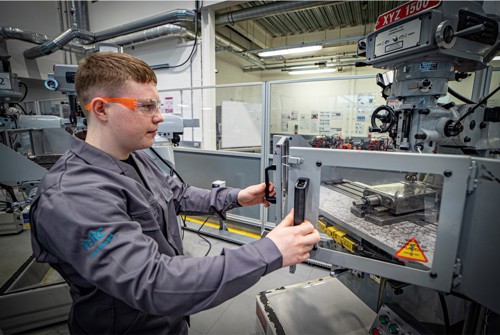According to Lloyds Bank’s Business Barometer, the sector closed 2023 with a confidence reading of 38%, showing a marked increase on the start of the year, when confidence was nine points lower. Here, Dave Atkinson (pictured above), Head of Manufacturing at Lloyds Bank, discusses his outlook for manufacturing and what businesses should be prioritising in the year ahead.
Prioritising technology investment
2023 saw developments in areas such as AI, the metaverse and big data continue apace, and this year looks to be no different. It’s clearer than ever that digitisation is essential to keeping up with the market and competitors.
In our December Business Barometer, we found that almost a third (30%) of manufacturers identified introducing new technology as their main target area for growth over the next six months.
The technology opportunity is two-pronged. Investing in and adopting tech in operations enables manufacturers to make their processes more efficient, increase productivity and reduce costs. For example, introducing the Internet of Things (IoT) into factories and investing in connected machinery will help manufacturers collect data which provides insights into where time or materials are being wasted.
It can even give an indication of components that are at risk of malfunctioning, so they can be repaired or replaced before they break, reducing lost manufacturing time and maintenance costs. 2024 will see more firms investing in this technology, with it becoming standard practice across modern factories in the next few years. Those who fail to prioritise digitisation risk falling behind.
Likewise, there is the opportunity for manufacturers to tap into demand from customers keen to be early adopters by bringing new technology innovations to the market before competitors.

Tackling the skills shortage
Last year, manufacturers grappled with staffing challenges, which are expected to persist into 2024. The current shortage of 74,000 factory workers is costing the UK economy £6.5bn annually.
Clearly, addressing the skills gap is imperative for manufacturers in the coming year. Currently, only 26% of those in manufacturing roles in the UK are women. Unleashing the potential within this underrepresented demographic could significantly alleviate the problem, as well as improving diversity within the sector.
Focusing on cultivating young talent is equally vital. The Advanced Manufacturing Training Centre (AMTC) plays an important role in supporting manufacturers by building a pipeline of future talent. With backing from Lloyds Bank, the AMTC has successfully trained over 3,000 apprentices, graduates, and engineers to date; a figure that’s expected to rise to more than 6,000 by 2030.
Sustainability opportunity
The landscape is evolving when it comes to sustainability requirements, with growing numbers of manufacturers viewing it as an opportunity for growth. By eliminating carbon emissions from factory floors and manufacturing processes, businesses can carve out a niche in the market and give themselves a competitive advantage.
Large businesses are facing increasing pressure to disclose their emissions, including those associated with their supply chain (scope three)4. If smaller manufacturers can produce a sustainability statement showing they are decarbonising, or prove their emissions are lower than other players in the industry, they can position themselves favourably against global suppliers.
There’s also a growing trend among the UK's top talent to seek employment with companies actively contributing to climate change mitigation. Upping their sustainability credentials may well offer manufacturers the chance to attract new skilled individuals.
While many of the challenges that were present in 2023 will continue into this year, I believe we’re set for an exciting year ahead for manufacturing and that the sector’s firms are well-placed to grasp the opportunities that lie ahead. Lloyds Bank will continue to be by the side of manufacturers as they look to invest in technology and sustainability, diversify, and grow.










